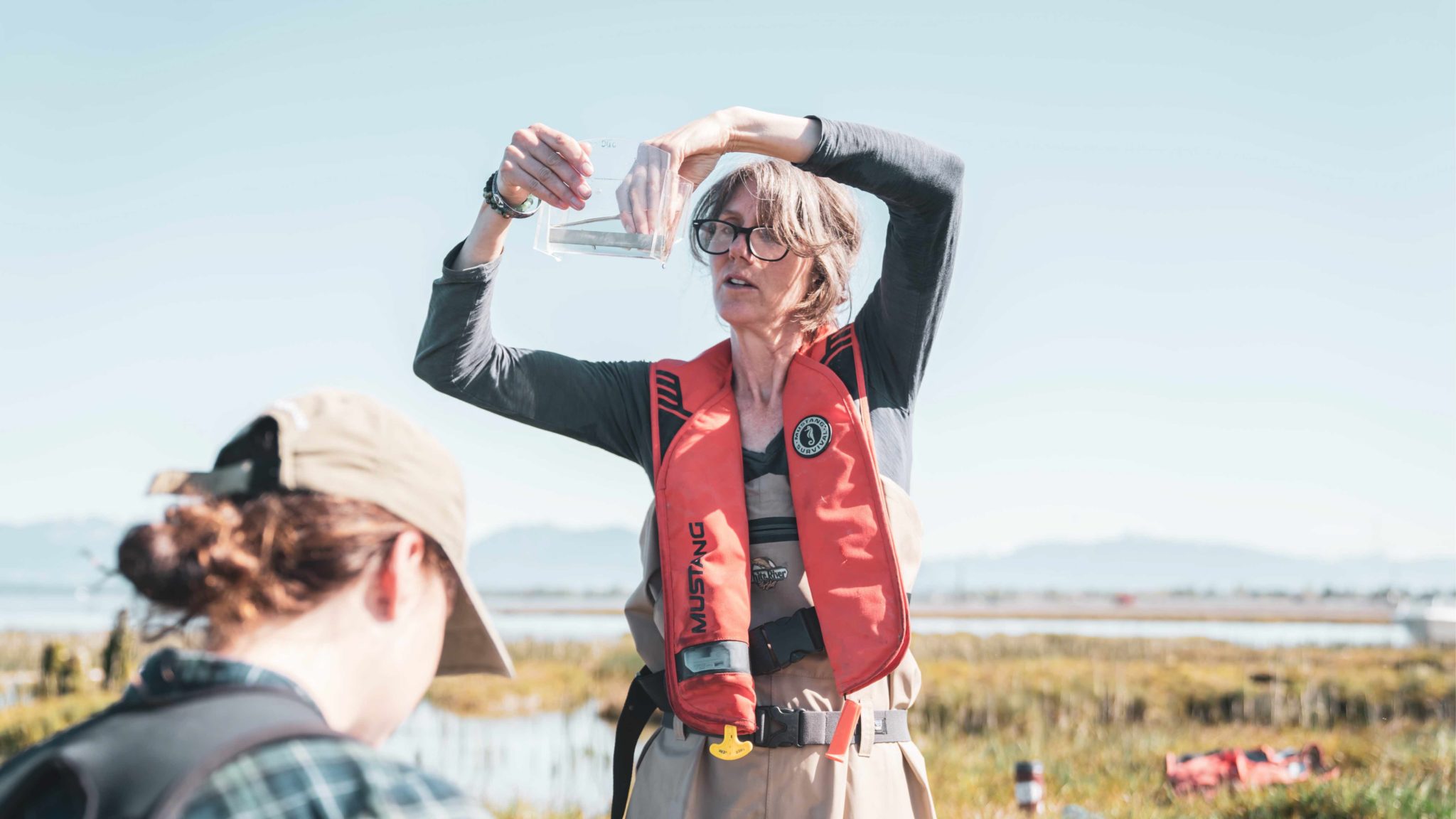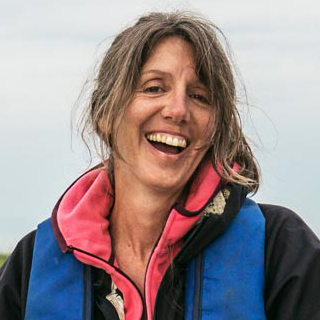
A biologist dives deep into Canada’s salmon-bearing watersheds
Misty MacDuffee is a biologist and program director with the Wild Salmon Program of British Columbia, Canada’s Raincoast Conservation Foundation. She focuses on fisheries ecology in salmon ecosystems; for the past 15 years she has led diverse studies examining the salmon of the BC coast, including field, lab, technical, and conservation evaluation. With the knowledge gained from her initiatives, she hopes to support ecosystem consideration in fisheries management.
How did you get started in conservation?

- In grade 6 or 7, I learned about the selective pressures on moths in industrial England changing the dominant moth colour from black to white, due to the black soot building up on trees that was changing the bark colour from dark to light. So the lighter coloured moths, formerly more abundant, were heavily predated and the dark morph of the moths then prevailed.
- I remembered when they logged a forest that I used to ride my horse through when I was young and I was shocked they could treat the forest and the animals that lived in that way.
- I remember (in high school) learning about acid rain in Ontario, Canada via a biologist who came to talk to our class. He said the high acidity/low pH, caused by pollution from the factories/ industry of the 1940s -1970s, was killing Ontario’s lakes. He saw a grandfather take his grandson out fishing early one morning and he didn’t have the heart to tell the old man there were no fish in the lake because it was dead. These things stuck with me.
What was the process of breaking into your career like?
It certainly wasn’t a straight line. If you asked me 25 years ago if I would be doing what I am now, I couldn’t have predicted it. I have a biology degree but I never gravitated to or excelled in academia. But here I am, straddling the line between a conservationist and publishing scientist.
I went to University after high school and studied Environmental studies and Environment science, but I never used this degree in any practical way. I travelled and worked through my 20s, including scoring a job with a natural history and adventure company that allowed me to work in the incredible lands and watersheds of Canada’s Great Bear Rainforest.
After about a decade of that and other work for a conservation organization, I went back to school and did a degree in biology. I was then hired to lead a salmon stewardship and restoration project on Vancouver Island and I did this for about 6-7 years, before going to work for Raincoast. Once I started working with Raincoast, I developed our Wild Salmon Program.
Can you elaborate more on the work you do in the Wild Salmon Program?
My title is the ‘Wild Salmon Program director’ and most of my work revolves around sustainable fisheries/salmon management, especially the need to consider ecosystems and wildlife when we manage fisheries. Most fisheries are unsustainable from an ecosystem perspective but that doesn’t change their management.
A lot of my work spills into working on Canada’s endangered population of Southern Resident killer whales, as these are salmon eaters, and the reason the whales are endangered is largely because their salmon food supply is also declining. Right now I am writing a chapter for a salmon book. My chapter is about how the management of salmon has failed the endangered whales.
Why salmon? What draws you to fisheries ecology?
Well I was originally more enamoured with all feathered, furred and finned creatures that ate salmon. But I had a remarkable opportunity to spend time in the pristine watersheds of BC’s Great Bear Rainforest about 25 years ago and I slowly became more drawn to salmon and what incredible fish they really are. They drive so much of the abundance that we have on the coast and many species have evolved to depend on them at some stage in their life.

Misty measuring salmon. Photo by Alex Harris.
On Raincoast’s website, it explains that the organization uses “informed advocacy” to drive conservation goals. Can you elaborate on this approach a bit more?
As an organization, Raincoast is somewhat unique. We hold strong conservation values for the protection of species, especially umbrella species like top predators. This includes the protection of carnivores from prosecution in trophy hunts, predator culls and lethal predator control. These often get characterized as animal rights issues.
But Raincoast is a science organization. We publish a lot of science on the role and importance of carnivores in the ecosystem (in top science journals) but we equally advocate for animal welfare. These 2 things are not usually combined. Scientists don’t usually hold strong conservation or value based perspectives. Because we aren’t arguing just on morals or values, and we are informed by our research, we coined the term “informed advocacy” to convey the balance of these two legs of our work “Science and conservation values”
What does a typical work day look like for you?
In summer it’s usually more fun, because fieldwork is always an option. We have a study in the Fraser River estuary examining juvenile salmon and I sometimes join the field crew. In the winter, it’s a lot more meetings and sitting at my desk.
These days there is too much sitting at my desk and not enough in the field (I think many people feel that way about their jobs). My days are often a lot of zoom calls, grant writing, paper or chapter writing, interviews, meetings, trying to keep up to speed on journal articles, that kind of thing.
What’s the best and worst part of your job?
There is never a time when there isn’t a mountain of work to do. So figuring out how you are going to manage that and stay sane is an important skill. I’m not sure I’ve mastered it. But I am very blessed to have a job that I love (for the most part), that I get to direct and design, and choose the work I want to do (for the most part), and work outside.
Some people think that I have a job where “I get to make a difference” and that must be better than other jobs. This can equally be a curse because I often feel I’m not making a difference, (and I should be). Also, seeing the world through an ecologist’s lens can get depressing. The planet’s a mess and it’s sometimes hard to believe we can turn this around.

The Fraser River beach seine crew. Photo by Mike Snyder.
Can you provide some advice for aspiring conservationists looking to enter the job market? How does your advice vary for those coming from a scientific background and those who don’t?
On a small scale, I think working at the local level is where change is going to happen. In communities, on the ground. A science background at this scale can be helpful in guiding good conservation decisions.
But on a global scale, I think there are important changes that need to occur in how humans make decisions about the planet and its species. This is what the chapter I am writing now is sort of about. And how come so much “conservation” work for salmon has largely failed?
I think these big themes will be what drives critical conservation decisions in the next decade, and that’s really all we have to turn this around. Young people are going to need to bust through the “market economy” ideology that has dominated the last 200 years of society’s thinking. The ideology of market economics has reshaped the world’s diverse cultures to function instead as a modern economic religion. It has commodified all social transactions and is the driver that converts the habitats of species into human goods and services. You don’t need a science background to change this. It’s ultimately political and ideological.
But I do think some kind of a science background is important in the specifics of species and habitat conservation because it provides such a solid compass to navigate decision making. It also can give a good foundation in ecology, but these skills can also be learned outside of academia. It really depends on what scale of conservation you want to work at.
Author profile | Nicole Van Zutphen

Careers Advice, Interviews, Ecologist, Policy Advocate, Project Manager, Scientist, Fisheries, Marine Conservation Jobs

